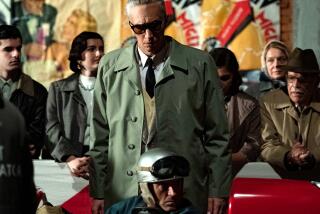Ferrari FF review: Ferocious yet practical
In the late 1940s, Enzo Ferrari reluctantly agreed to build road cars as a way to finance his racing outfit.
One has to wonder, though, whether he would have signed his name to today’s Ferrari FF, a four-seat, all-wheel-drive hatchback intended to broaden the brand and boost global sales. Designed to lure a new kind of customer, the FF comfortably totes four passengers and their luggage without worrying mortal drivers about landing wheels up in a ditch.
Ferrari calls the body a shooting-brake design, which probably plays better than “hatchback” on the lot in Beverly Hills. At a few inches shorter than a Ford Explorer, the FF boasts more trunk space than a Toyota Camry does. And that’s behind four leather-lined seats that can actually fit adults for trips of appreciable duration. It literally gives buyers more to like, and the results stand out on Ferrari’s balance sheet.
In 2012, sales in the U.S., Ferrari’s largest market, were up 11.2% over 2011, according to research firm Autodata. Though Ferrari doesn’t disclose sales for individual models, the company says the success of the FF helped global V-12 sales climb 22% in the first three quarters of 2012, boosting profit 7.6%.
A cursory glance at the spec sheet of our Ferrari FF tester tells you where at least a portion of that profit is derived.
The car starts at $295,000. But a liberal flogging of the options boxes ran our test car up to $377,341. That extra $82,000 includes an $11,000 “Grigio Abu Dhabi” paint job (or as it’s known to us poor folk, silver). Other overpriced goodies include a $3,500 backup camera; a $5,800 suspension-lifting system to prevent driveway scrapes; and $4,400 privacy glass for the rear windows.
Curiously, a sport exhaust system costs just $700, a strikingly better value than the camera. Also odd for a car costing the GDP of New Hampshire: an outdated navigation and stereo system from a garden-variety Jeep.
But the important equipment on the FF — the drivetrain — comes standard. Mr. Ferrari would have no quibble here. A direct-injected 6.2-liter, V-12 engine makes 651 horsepower as it screams along at 8,000 revolutions per minute. The car makes 504 pound-feet of torque at a quieter 6,000 rpm. Ferrari says the bulk of that, 369 pound-feet, is available between 1,000 and 8,000 rpm.
A seven-speed, dual-clutch transmission routs power to the wheels, where Ferrari has installed a proprietary all-wheel-drive system that it says is 50% lighter than a conventional setup. The FF pulls off this sleight of hand by essentially acting as a rear-wheel-drive car most of the time. Only when the vehicle’s systems detect the rear wheels slipping can up to 20% of the engine’s torque be routed to the front wheels via a second, two-speed gearbox.
This system can also vary the torque sent to each of the front wheels. By pushing more power to the outside wheel when cornering, the FF can better pull itself through the turn.
The FF provides yet another layer of technology to keeping the car safely planted on the roadway, with a dial on the steering wheel that lets drivers choose among four electronically enhanced driving modes: snow, wet, comfort and sport. The various settings alter throttle response, transmission shift points, and traction and stability control thresholds. You can also shut the electronic nannies off entirely.
This being Los Angeles, 300 miles of testing were limited to dry roads, so the “snow” and “wet” settings went unused. A missed opportunity perhaps, but a testing environment that Ferrari says replicates where the vast majority of FF buyers will drive.
Also unused was the “off” setting. Neither I nor anyone who takes my phone calls has $377,341 to hand Ferrari after wrapping the car around one of Mulholland Highway’s finest telephone poles. But “sport” mode allows more than enough fun, and the computers don’t object to swinging the FF’s tail around a bit when accelerating out of a turn.
Otherwise, the FF stays glued to the pavement and carves up curves with predictable precision. The chassis feels composed and solid, probably because of a hefty curb weight of 4,145 pounds, or about 550 more than Ferrari’s latest V-12 GT car, the F12 Berlinetta. Only the overeager steering took careful attention.
Meanwhile, the dual-clutch transmission rips off rapid-fire shifts with ease. Even in full automatic mode, the gearbox has no fear of its 8,000-rpm redline and demonstrates remarkable intuition in deciding when and, crucially, when not to shift. The only minor weakness here was an occasional tendency toward abrupt downshifts at low speeds.
In daily driving, the FF proved remarkably easy to live with; this car shares little of the anxiety of its 458 Italia brethren. The ride of the FF’s magnetic suspension, also seen on General Motors products including the Chevrolet Corvette, was perfectly compliant in both the normal and “bumpy road” settings.
The FF represents the next evolution in a long line of grand touring cars from Ferrari, as opposed to more high-strung sports cars such the mid-engined 458, designed with race-car handling foremost in mind. GT cars, by contrast, are best suited to cover long distances at high speeds in relative comfort.
Ferrari’s definition of the genre has traditionally involved a V-12 engine up front, a pair of passengers in the middle and meaningful trunk space in the rear. The FF applies the same concept to a four-passenger car — and adds all-wheel-drive for the first time on a Ferrari.
This odd mix of ferocious performance and practicality comes wrapped in an unusual but handsome package. The long, wide hood gives way to a wind-swept cabin and a sloped rear hatch. In person, its curves pop and seduce much more than they can in two dimensions.
Those curves also speak to the limits of Ferrari’s willingness to compromise. Though the company undoubtedly wants global sales to continue their climb, it will soften the car only so much.
After all, its eponymous founder didn’t even want to sell road cars in the first place.







